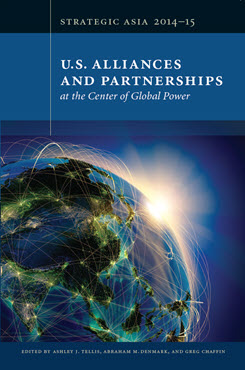Seeking Alliances and Partnerships
The Long Road to Confederationism in U.S. Grand Strategy
This chapter from Strategic Asia 2014–15: U.S. Alliances and Partnerships at the Center of Global Power reviews how the U.S. came to treat alliances and partnerships as essential instruments of its quest for hegemony over time, what tasks U.S. alliances performed in the past, and how their functions promise to mutate in the future.
EXECUTIVE SUMMARY
MAIN ARGUMENT
Despite frequent references to the U.S.’s early isolationist past, the country has consistently rejected both isolationism and multilateralism as instruments for meeting its highest strategic ambitions, instead utilizing a dialectical relationship between confederationism and unilateralism to achieve hegemony. U.S. power, no matter how formidable, benefits from the presence of partners, thanks to both their capacity to supplement American resources and their ability to bestow legitimacy to various U.S. policies. Even when these are not at issue, however, the company of confederates is undoubtedly valuable because it enhances the freedom that the U.S. enjoys to undertake unilateral actions whenever these are demanded by its global interests.
POLICY IMPLICATIONS
- Confederationism, as a constituent element of U.S. grand strategy, is here to stay. As Washington focuses on national rejuvenation, it does not have the luxury of jettisoning its alliances because no matter what their infirmities currently may be, they are essential to preserving U.S. global hegemony.
- In an environment characterized by both deepening interdependence and rising Chinese power, Washington’s quest for partnerships in the Indo-Pacific region is eased by the fact that a large number of nations therein value the U.S. and its protective presence because of the positive externalities accruing to them.
- The cohesion between the U.S. and its many partners is likely to be greatest when U.S. power is at its most durable and resolute. The ultimate value of confederationism as an anchor of grand strategy, thus, hinges fundamentally on the vitality of U.S. power.
Strategic Asia
The Strategic Asia annual edited volume incorporates assessments of economic, political, and military trends and focuses on the strategies that drive policy in the region. Learn more about Strategic Asia.



